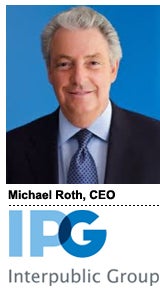 Questions remain about Interpublic Group despite the strong second-quarter revenues reported Wednesday.
Questions remain about Interpublic Group despite the strong second-quarter revenues reported Wednesday.
On a call with investors, IPG chief executive Michael Roth spun the rash of media reviews – which some have nicknamed “pitchapalooza” – in a positive light, positioning the wave of media agency jump balls as an opportunity to win business.
But any positive or negative impact of ongoing media reviews won’t be immediately apparent, he said.
“We don’t expect to see an impact on the media side of the business as a result of these reviews until 2016,” Roth said. “And hopefully we’ll see positive impacts.”
IPG is defending at least one major account: Johnson & Johnson. J&J’s $1.6 billion in annual media spend was split between IPG and Omnicom Group until May, when the CPG giant put the business up for review.
“A number of reviews involve defending existing client businesses, where we are one of multiple incumbents, which means there’s both a risk and upside for us,” Roth said, adding that IPG is pursuing new opportunities and passing on others due to conflicts with existing accounts or to manage resources.
According to Roth, the volume of media business in play is a function of clients’ demand for greater efficiencies as well as cyclical reviews on the part of some clients. “It is also a reflection on the fact that technology is impacting communications, planning and media investment decisions,” he said.
Roth also talked about clients’ questions regarding kickbacks and taking a position in media.
“A lot of ink is being spent on making a point about the issues of transparency and rebates,” he said. “If I were a client, I would be asking the same questions.”
IPG has been vocal in recent earnings calls about its agnostic approach to media buying. That’s a distinction for IPG, said Roth, and something its clients value. But Roth was quick to add that IPG’s strategy could change.
“You will not see inflated organic gross numbers from us as a result of taking inventory or ownership in terms of selling media to our clients,” he said.
But, he added, “There’s no question that some of our competitors are having success going a different way. That’s something we’re going to consider and we always will consider as we move into 2016.”
According to Pivotal Research analyst Brian Wieser, who downgraded many holding company stocks earlier this year, IPG’s size could help it weather the storm of media reviews. The holding company could be “less exposed to the issue to begin with,” Wieser wrote in a research note.
“However, the noise we expect from the industry will be negative sector-wide and may contribute to more aggressive negotiations between marketers and agencies more generally.”
IPG’s revenue in Q2 2015 increased 1.3% to $1.88 billion, up from $1.85 billion a year ago. Organic growth was 6.7%, made up by 7.7% organic growth in the US and 5.2% organic growth internationally. IPG saw strong growth in the US, UK and Asia Pacific markets. Meanwhile, Brazil and China require monitoring.
But on the strength of its quarter, the holding company increased its full-year revenue growth projection to 4-5%, up from its previous goal of 3-4%. IPG also has an acquisition pipeline, and expects to close a number of deals in the second half of the year.














